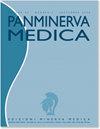适当管理心房颤动患者的临床决策。
IF 4.3
4区 医学
0 MEDICINE, GENERAL & INTERNAL
引用次数: 0
摘要
心房颤动(房颤)患者的管理需要复杂的临床决策,以优化治疗效果。在日常临床实践中,医生要做出艰难的选择,以便更好地管理心房颤动患者。他们需要平衡血栓栓塞和出血风险,关注患者的症状,并管理多种并发症。在这篇综述中,我们旨在探讨房颤患者临床决策的多方面问题,包括临床房颤的定义和诊断、卒中风险分层、口服抗凝剂治疗选择、出血风险考虑以及节律和心率控制策略之间正在进行的争论。我们还将关注房颤患者管理中可能存在的灰色地带。在驾驭这一错综复杂的局面时,临床医生必须调和患者特异性因素、不断发展的指南和新兴疗法之间的动态相互作用。本综述强调了个性化、循证临床决策的必要性,以便根据心房颤动患者的具体情况量身定制干预措施,获得最佳疗效。本文章由计算机程序翻译,如有差异,请以英文原文为准。
Clinical decisions for appropriate management of patients with atrial fibrillation.
The management of patients with atrial fibrillation (AF) requires intricate clinical decision-making to optimize outcomes. In everyday clinical practice, physicians undergo difficult choices to better manage patients with AF. They need to balance thromboembolic and bleeding risk to focus on patients' symptoms and to manage a variety of multiple comorbidities. In this review, we aimed to explore the multifaceted dimensions of clinical decision-making in AF patients, encompassing the definition and diagnosis of clinical AF, stroke risk stratification, oral anticoagulant therapy selection, consideration of bleeding risk, and the ongoing debate between rhythm and rate control strategies. We will also focus on possible grey zones for the management of AF patients. In navigating this intricate landscape, clinicians must reconcile the dynamic interplay of patient-specific factors, evolving guidelines, and emerging therapies. The review underscores the need for personalized, evidence-based clinical decision-making to tailor interventions for optimal outcomes according to specific AF patient profiles.
求助全文
通过发布文献求助,成功后即可免费获取论文全文。
去求助
来源期刊

Panminerva medica
医学-医学:内科
CiteScore
5.00
自引率
2.30%
发文量
199
审稿时长
>12 weeks
期刊介绍:
Panminerva Medica publishes scientific papers on internal medicine. Manuscripts may be submitted in the form of editorials, original articles, review articles, case reports, special articles, letters to the Editor and guidelines. The journal aims to provide its readers with papers of the highest quality and impact through a process of careful peer review and editorial work. Duties and responsibilities of all the subjects involved in the editorial process are summarized at Publication ethics. Manuscripts are expected to comply with the instructions to authors which conform to the Uniform Requirements for Manuscripts Submitted to Biomedical Editors by the International Committee of Medical Journal Editors (ICMJE).
 求助内容:
求助内容: 应助结果提醒方式:
应助结果提醒方式:


